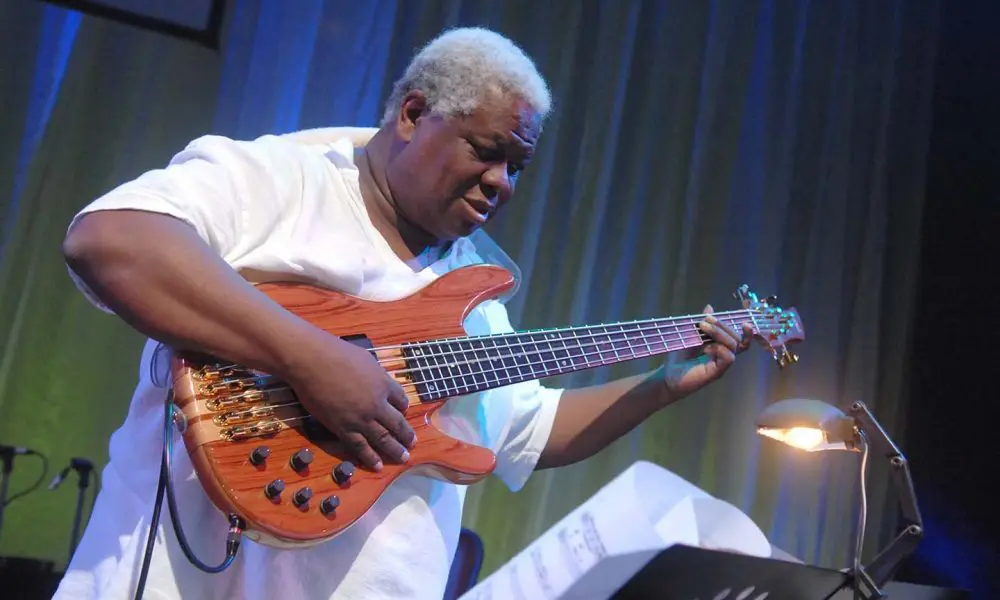Session Musician Spotlight: Abraham Laboriel
The bassist has played on thousands of records, including hits by Quincy Jones, Dolly Parton, Chaka Khan, and more.

Bassist Abraham Laboriel has been getting behind the groove on recordings by Quincy Jones, Dolly Parton, Chaka Khan, Barbra Streisand, and Andraé Crouch for over 50 years. “Rhythm is my heart,” he once told Bass Player. “Once you get a rhythm going, it isn’t necessarily always a pattern, but a way of feeling music that complements what everyone else is doing.”
Born in Mexico City to a family of artists, Laboriel began playing guitar at the age of six, teaching himself to play by ear. He spent his teens working as an arranger and musician, and entered Berklee School of Music in 1968 as a guitar player. Then, a year before graduation, he shifted to bass. He told Bass Magazine, “For my small hands, it was perfect. I was completely at home. Students began to hire me for gigs and recordings. But I had to continue to declare guitar as my main instrument, because the Board of Education did not recognize electric bass as a legitimate instrument.”
After graduation, he hit the road with Johnny Mathis and Henry Mancini, which connected him to the community of “first call” session players in Los Angeles, leading to his eventual move to the city in 1976. Since then, Laboriel has brought his distinctive sound to chart-topping hits and recordings in every genre imaginable, with over 4,000 sessions to his credit. Additionally, he cultivated a successful career as a solo artist and as a part of groups like Koinonia, the Larry Carlton Quartet, and Open Hands.
Here are a few memorable moments from his prolific career.
David Shire – Manhattan Skyline (Saturday Night Fever)
Abraham Laboriel’s touch was present in the rollicking bass line of this tune – one of the definitive moments from the blockbuster Saturday Night Fever. The soundtrack won the Grammy for Album of the Year at the 1979 Grammy Awards and sold over 40 million copies.
Lionel Richie – All Night Long
This 1983 single from Lionel Richie’s sophomore album, Can’t Slow Down, hit #1 on three different charts and scored four Grammy nominations. Stereogum reflected on the single, noting its “rubbery basslines” and the star-studded players that “get funky and busy, doing subtle push-pull things that serve the song. It works.”
Joe Cocker and Jennifer Warnes – Up Where We Belong
Alongside session royalty like Leon ‘Ndugu’ Chancler, Bobby Lyle, Robbie Buchanan, and Paulinho Da Costa, Abraham Laboriel is front and center in the mix on this international hit from the 1982 film An Officer and a Gentleman. The recording won the Grammy for Best Pop Performance by a Duo or Group the following year. Laboriel would also play on BeBe and CeCe Winans’ gospel cover of the song in 1984, which earned the duo their first Grammy nomination.
Sheena Easton – Strut
As producer Greg Mathieson sought a “young, spikey and aggressive sound” for Easton’s platinum-selling A Perfect Heaven, he called Abraham Laboriel to handle bass duties for the entire album, which included this top ten pop hit as well as the Prince-composed single, “Sugar Walls.”
Reba Rambo – He Gave Me Music
As Abraham Laboriel once explained, “[Music] comes from a spiritual realm. The moment we start making music, we are in touch with a force that is designed to make people forget about their problems, to bless them, and to make this a better world.” You can hear this in Laboriel’s commitment to gospel/contemporary Christian music. He teamed with Grammy and Dove Award winner Reba Rambo in 1982 for this live recording that featured him in an ecstatic step-out.
Michael Giacchino – Renouncing the Renunciation (Incredibles 2)
Abraham Laboriel’s extensive film soundtrack work has included multiple collaborations with composer Michael Giacchino. Laboriel told Bass Player that Giacchino’s guidance echoed his early work with Henry Mancini: “Giacchino said, ‘Abraham, Mancini told you: If we wanted what was on the paper, we could call anyone. Please – ignore the paper. Play you.’ Incredibles, Ratatouille, Coco – all that stuff is a result of me being encouraged to just play me.”
Looking for more? Check out our series of articles on the greatest sessions musicians ever.












